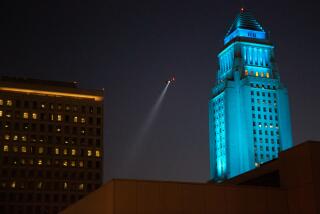Army Suspends Hughes Funds : Accounting Practices of Helicopter Firm Probed
- Share via
WASHINGTON — The Army disclosed Friday that it has launched a “thorough investigation” into “serious charges of accounting irregularities” at Hughes Helicopter Inc., a subsidiary of one of the nation’s largest defense contractors.
Army Secretary John O. Marsh Jr. said that $3.5 million in payments to Hughes for overhead expenses have been suspended since May 17 as a result of a Defense Contract Audit Agency report citing numerous accounting deficiencies.
Among them are “charges for unallowable costs, charges for duplicate costs and inadequate internal controls involving millions of dollars,” Marsh said in a statement. He said that payments for overhead--expenses other than goods and labor--will not be resumed until Hughes has “satisfied the Army that acceptable internal controls have been established.”
Marsh said he has named Undersecretary James R. Ambrose to direct the investigation. According to Army officials, the Army pays Hughes an average of $30 million a month for overhead expenses.
Hughes, based in Culver City, is a subsidiary of McDonnell Douglas Corp. of St. Louis, which purchased the firm from the estate of the late Howard Hughes in January, 1984.
Army officials said that Hughes has about $4 billion in contracts with the Army, with $3.5 billion involving the AH-64 Apache helicopter and the rest going to manufacture of the 25-millimeter Bushmaster gun for the Bradley Fighting Vehicle. The Army plans to buy 675 of the Apache helicopters by fiscal 1988 at a total cost of $9 billion. So far, 26 of the helicopters have been delivered, the Army said.
Other Funds May Be Cut Off
Payments of $30 million a month for actual work on the helicopters and guns will continue, officials said, adding that the investigation will determine if that money should be cut off, too.
Announcement of the investigation adds Hughes to a growing list of major defense contractors being investigated for a variety of alleged offenses--from padded expenses to production overcharges.
It comes amid a continuing fight in Congress over whether to curb the nation’s defense budget and is almost certain to bolster critics’ arguments for an overhaul of the nation’s defense contracting system.
In St. Louis, McDonnell Douglas spokesman Gerald J. Meyer asserted that the aerospace firm will be vindicated “in a matter of days” because it has cleared up any problems that may have existed before.
Aware of Deficiencies
Meyer said that, when McDonnell Douglas acquired Hughes in 1984, “We became aware that there were problems and deficiencies with its accounting and internal control systems.
“Upon becoming the owners, we applied to them our internal control standards, which we think are clearly time-proven ones. Those are now in place.”
Meyer said he understood that the investigation would cover the period from 1979 to 1983, before McDonnell Douglas took over Hughes. But Army officials indicated that the investigation would not be confined to time before McDonnell Douglas’ ownership.
Maj. Donald P. Maple, a spokesman, said: “The Army is going to look at the issue of Hughes Helicopter’s internal accounting, and I don’t have any indication that the investigation will center merely over that period.”
Announcement Delayed
Maple said also that he did not know how long the investigation would take. He said announcement of the May 17 cutoff of overhead payments was not made for a week because the Army was studying the audit agency report.
“We try not to make snap decisions about such things,” he said.
As outlined by Maple, areas that will be investigated include advertising expenses, legal expenses, unspecified membership fees, travel expenses and bad debts.
Maple said it was not possible to determine how much money is at issue in the investigation. But he cited specific amounts that are being questioned because the Hughes expense ledgers and payroll registers “do not seem to jibe.”
Discrepancies include $1.7 million in executive bonuses and $61 million in employee compensation for 1983. Maple cautioned that, although there appear to be “lots of irregularities” at Hughes, the job of the investigation “is to attempt to determine to what extent these irregularities resulted in overpayments” by the Army.
More to Read
Inside the business of entertainment
The Wide Shot brings you news, analysis and insights on everything from streaming wars to production — and what it all means for the future.
You may occasionally receive promotional content from the Los Angeles Times.










